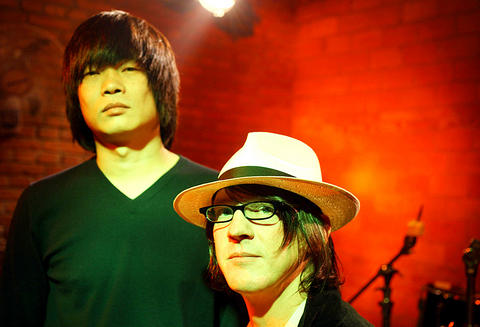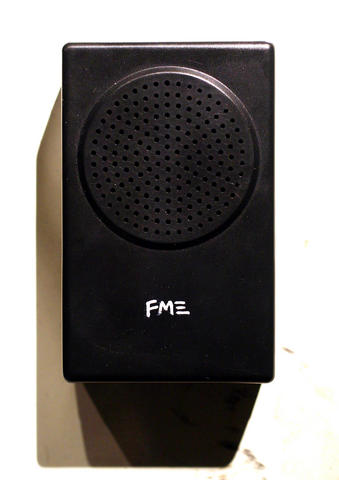Down a short alley in the sprawling, tourist-mobbed 798 art district here - a complex of 1950s-era military factories converted into galleries and studios - is a tiny shop that serves as one of the centers of China's small but thriving experimental music scene.
The store, Sugar Jar (白糖罐), is barely big enough to accommodate a half-dozen customers, and one wall displays all the essentials of the genre, from discs of abstract electronica and brutal noise-rock to anthologies with bold titles like China: The Sonic Avant-Garde. Playing samples from his stock, the proprietor, a lanky, soft-spoken man named Lao Yang (楊利才), noted proudly that his store is one of the only spots in all of Beijing to buy much of this music.
Like Sugar Jar, avant-garde music occupies a minuscule niche in Chinese society, overshadowed by the larger and vastly more lucrative world of contemporary visual art. Only a few dozen musicians around the country make up this circle, but their work has begun to attract international attention, and over the last several years a steady stream of Western musicians, including Brian Eno and the New York guitarist Elliott Sharp, have visited and given their blessing.

PHOTO: NY TIMES NEWS SERVICE
"The feeling of the scene in Beijing is exciting and reminds me of New York in 1979," said Sharp, who last performed here in April. "There's a tangible sense of discovery and transgression."
Though China may be in the beginnings of a new love affair with consumerism, rigid cultural controls are still in place, and discovery and transgression are values not widely held by the Communist government. Following President Hu Jintao's (胡錦濤) call for moral purity in society, broadcasters have come under increasing pressure lately to keep potentially subversive material - which means anything but sugary, shallow pop - off the airwaves. At the end of the Communist Party Congress in last month, the official Chinese Music Association denounced the "vulgar" pop music reaching the nation's youth through the Internet.
Growing out of rock and electronic music, and operating outside the state-supported classical sphere, the experimental scene in China has existed for barely a decade. Its hub is Beijing, with the electronic performers Wang Fan (王凡), Sulumi (蘇大威), Yan Jun (顏峻) and FM3; Sun Wei (孫偉), who creates sound collages under the name 718; and Dou Wei (竇唯), one of China's biggest rock stars, whose solo career includes numerous spacey, dreamlike albums that incorporate traditional instrumentation.

PHOTO: NY TIMES NEWS SERVICE
Shanghai has one of the most extreme noise groups, Torturing Nurse, which sometimes performs with a female member in a nurse's uniform. Huanqing, from Sichuan Province, makes field recordings from the hinterlands of China and manipulates them with electronics.
Though Western styles have influenced them, the Chinese musicians have for the most part developed in isolation, and their work is flush with the excitement of creating a new kind of music with no previous national model.
"Chinese people don't know the best music system," said Yan, who is also an influential critic. "There are no rules. No teacher. I can use this, I can use that - that's all interesting. In the West everything was created already. But here we don't know that."
In Beijing the subculture that surrounds this music is so small that most of the major participants often turn up at a weekly concert and gathering at 2Kolegas, a bar inside a drive-in movie complex on the east side of town. One recent night Yan led an audience-participation performance that involved strips of plastic sound triggers laid on the floor, to be danced on, stepped on or smacked.
It could have been a musical game of the kind that flourished in downtown New York lofts in the 1970s, except for the overhead ambient music with Chinese instrumentation that played through a sound system. Among those in the crowd were the members of FM3, who frequently employ Chinese sound elements, as well as Wu Na (烏娜), who plays the zither-like guqin (古琴).
Despite the new openness of Chinese society and its arts, the stultifying influence of the state is still felt in mass entertainment like the candied pop that fills the airwaves, and even in the often dull music coming out of the universities.
Kenneth Fields, a professor of electronic music at the Central Conservatory of Music in Beijing, complained of a lack of creativity and free thought among students at his and other universities. The most exciting new music in China, he said, comes from the underground.
"Media is very centrally controlled at the top; at the bottom it seems to be a mirror of anarchy," Fields said. "There's no innovation at the top, but on the bottom there's a lot of informal freedoms."
The experimental and underground rock musicians represent the most creative contingent of Chinese music, and the scene has had its first bona fide international hit: FM3's Buddha Machine, a device slightly bigger than an iPod that plays nine electronic drones, has sold nearly 50,000 units around the world and already spawned remix albums. Christiaan Virant, a US-born musician who is half of FM3, arrived at 2Kolegas in a spiffy black suit with a while silk scarf and a white Panama hat. The other half is a Chinese man, Zhang Jian (張薦). His new prosperity, he said, is "all 100 percent thanks to the Buddha Machine."
But this music has received scant attention at home, from the marketplace or, for good or ill, from the government. The Buddha Machine is not widely available in China, because the low price demanded by the domestic market would make the cost of distributing it prohibitive, Virant said. (It is, of course, for sale at Sugar Jar.)
Like most pockets of avant-garde music, the Chinese musicians have no real commercial prospects. And while relatively few links exist to contemporary visual arts, that world and its moneyed clientele provide essential ancillary income.
Artists who might have minimal record sales - meaning hundreds of copies, or even fewer - can make money doing sound installations at galleries and, increasingly, through commissions from real estate developers looking to add a cool factor to their buildings by using sound art commissioned from underground musicians.
"There are huge amounts of rich people in China who lavish huge amounts of money on weird stuff," Virant said.
The attention did not seem so lavish one recent afternoon at Sugar Jar. Over a few hours several curious gallery-goers wandered into the shop and looked around at the CDs for sale, though none bought anything. Lao said he operates the store without a proper retail license - that, he said, would necessitate stocking music for mainstream tastes, an intolerable concession - and until recently slept in the back.
He said he had no illusions that the music he sells will be accepted by a mass audience. He added that what he hopes for most is support from the government in the form of public festivals and other profile-raising events.
"Even though this music can't be accepted by most of the people," he said, "this is the real music of China."

On April 26, The Lancet published a letter from two doctors at Taichung-based China Medical University Hospital (CMUH) warning that “Taiwan’s Health Care System is on the Brink of Collapse.” The authors said that “Years of policy inaction and mismanagement of resources have led to the National Health Insurance system operating under unsustainable conditions.” The pushback was immediate. Errors in the paper were quickly identified and publicized, to discredit the authors (the hospital apologized). CNA reported that CMUH said the letter described Taiwan in 2021 as having 62 nurses per 10,000 people, when the correct number was 78 nurses per 10,000

As we live longer, our risk of cognitive impairment is increasing. How can we delay the onset of symptoms? Do we have to give up every indulgence or can small changes make a difference? We asked neurologists for tips on how to keep our brains healthy for life. TAKE CARE OF YOUR HEALTH “All of the sensible things that apply to bodily health apply to brain health,” says Suzanne O’Sullivan, a consultant in neurology at the National Hospital for Neurology and Neurosurgery in London, and the author of The Age of Diagnosis. “When you’re 20, you can get away with absolute

May 5 to May 11 What started out as friction between Taiwanese students at Taichung First High School and a Japanese head cook escalated dramatically over the first two weeks of May 1927. It began on April 30 when the cook’s wife knew that lotus starch used in that night’s dinner had rat feces in it, but failed to inform staff until the meal was already prepared. The students believed that her silence was intentional, and filed a complaint. The school’s Japanese administrators sided with the cook’s family, dismissing the students as troublemakers and clamping down on their freedoms — with

As Donald Trump’s executive order in March led to the shuttering of Voice of America (VOA) — the global broadcaster whose roots date back to the fight against Nazi propaganda — he quickly attracted support from figures not used to aligning themselves with any US administration. Trump had ordered the US Agency for Global Media, the federal agency that funds VOA and other groups promoting independent journalism overseas, to be “eliminated to the maximum extent consistent with applicable law.” The decision suddenly halted programming in 49 languages to more than 425 million people. In Moscow, Margarita Simonyan, the hardline editor-in-chief of the